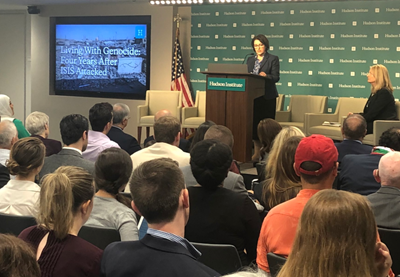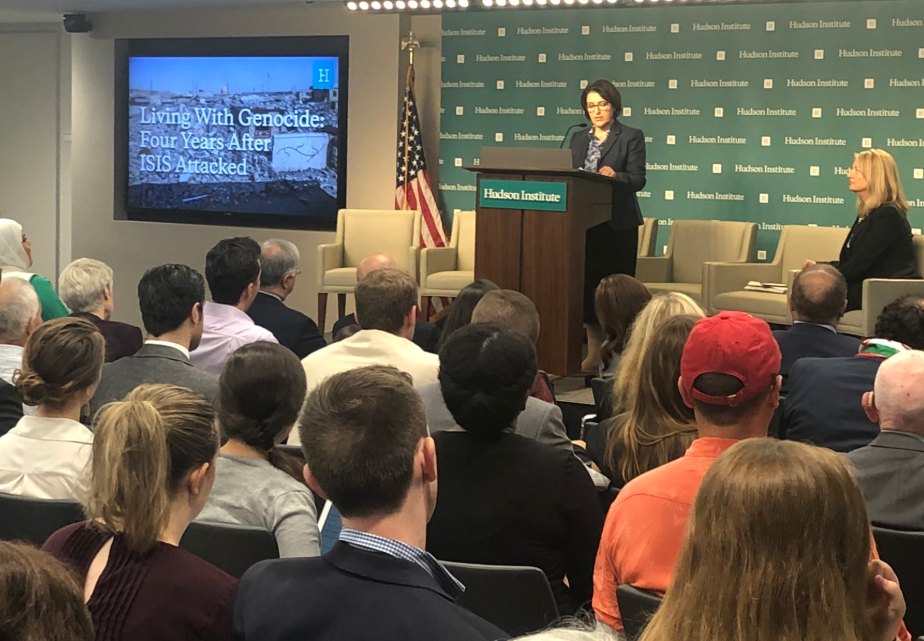Kurdistan Regional Government
Representation in the United States
Representation in the United States
Friday 3 August 2018
Living With Genocide: Four Years After ISIS Attacked
Living With Genocide: Four Years After ISIS Attacked
(PRESS RELEASE HERE)
Bayan Sami Abdul Rahman
KRG Representative to the United States
Hudson Institute
Friday August 3, 2018
Washington, DC, USA
Good afternoon
Thank you Nina Shea. Ambassador Yasseen, honoured speakers, ladies and gentlemen, thank you all for joining us.
I would like to thank the Hudson Institute and the Religious Freedom Institute for co-hosting this event to commemorate and honor the victims of ISIS’ genocide.
Genocide has been the fate of many different groups in Kurdistan and Iraq. It is important that we recognise what happened to them – to the Yezidis, the Christians, the Shabaks, the Kakayis, the Kurds, the Arabs, the Barzanis, the Faylees, the people of Halabja, Kirkuk and the Kurds killed in the Anfal campaign. There are many others who also suffered through terrorism, oppression and violence.
The challenge for us is to keep the memory of these horrific tragedies alive, to preserve the dignity of those we have lost, and at the same time to move forward without allowing hatred and division to grow.
We must never forget the crimes that ISIS committed four years ago when it rampaged across Iraq in 2014 and on August 3 targeted Shingal or Sinjar and other parts of Nineveh. We must do all we can to help the survivors, to restore their homes and livelihoods and to seek justice for the victims of ISIS crimes.
When ISIS struck in the summer of 2014, it hurt all the components of our society. No single community was left unscathed. However, it is the minorities who bore the brunt and thousands were killed, hundreds of thousands were forced to abandon their homes, livelihoods, dreams and hopes, while others, especially Yezidi women and girls, became the victims of systematic rape and enslavement.
The Kurdistan Regional Government welcomes the United States’ call for countries that believe in religious freedom to establish August 3rd as a day of remembrance for survivors of religious persecution. This call was made last week at the first Ministerial Conference To Advance Religious Freedom, hosted by the State Department. The KRG has observed this anniversary and will continue to do so and to support everyone’s right to practice their faith. We commend the commitment of President Trump’s Administration to promote and defend religious freedom as a human right around the world. The KRG values the United States’ financial assistant to restore the Nineveh Plain, and fully supports US commitment to promote stability and security in Iraq through religious freedom.
What about us, what should we be doing? It is long overdue for us in Iraq and our international allies to find a way to put an end to the repeated cycles of violence in our country. Ensuring security, stability and economic opportunity across Iraq is the only way to enable every citizen, including those from minority groups, to live a reasonable life. Without these ingredients, reconciliation and trust cannot be achieved.
The steps that need to be taken are many. I made a list last year. Sadly, I need to read it out again as little has changed.
- Security, stabilisation and reconstruction – We need the liberated areas to be de-contaminated of mines and IEDs and militias to be removed so that communities can return home.
- Economic opportunities and development – We welcome the pledges of $30billion in investment in Iraq that were made at the Kuwait conference earlier this year. But when will those pledges be implemented? Without housing and job opportunities, the displaced cannot return home and those once-thriving towns and villages in Nineveh and Kirkuk will remain rubble.
- Legislation to bring about equal citizenship - We need changes in national laws that currently do not treat women and religious and ethnic minorities as equal citizens.
- Local autonomy – Many of the communities in Shingal and Nineveh have called for their towns and villages to be protected and run by their own communities. The KRG has and continues to support this but notes that there is not such support from others.
- Build an army – Iraq needs to build an army that truly reflects the make-up of the country and not just one component.
- Professionalise, train and equip the peshmerga – This is essential and the KRG is working on making the Peshmerga into a professional unified force. The Ministry of Peshmerga has embarked on a reform programme with the technical assistance of the United States, Germany and Britain.
- Education – Our children, whatever their ethnic and religious background, need to be educated about religious freedom, human rights and respect for the other. Sadly, across the Middle East, this is rarely the case.
- Justice and accountability – The KRG welcomes the UN Security Council Resolution 2379 to establish an independent investigative team to support domestic efforts to hold ISIS accountable for its actions in Iraq. The KRG is fully committed to assist and support the investigative team. But the team and the various department of the UN must ensure they include the KRG in the discussions and the process of gathering evidence and drafting local laws. We have established an evidence-gathering centre, many of the survivors are in Kurdistan and many of the perpetrators are in our custody. It is essential that the KRG not be excluded from this process.
The KRG has taken several steps to raise international awareness about the genocide, support survivors and alleviate their suffering:
- The Kurdistan Regional Government was the first to recognise ISIS’s crimes as genocide. In 2014, we established a high committee to gain international recognition of these crimes.
- The KRG has encouraged the United Nations and the ICC to investigate ISIS and create an international or hybrid tribunal, in addition to holding trials in local courts.
- As of July 2018, the KRG Prime Minister’s office and security services have helped 3,315 yezidis to escape but 3,102 remain in captivity.
- We have protected and provided shelter for 1.8 million IDPs and refugees and we have provided resources to the Christian churches, Yezidi organisations and other communities who fled ISIS.
- Our peshmerga forces have made great sacrifices. 1,713 peshmerga were killed and almost 11,000 have been injured.
My message to all ethnic and religious components in Iraqi Kurdistan Region – my message to our Yezidi and Christian brothers and sisters – is to stay in our country, to say in your homeland. We can, together with the help of our international partners, do our best build a prosperous future for all. We see strength in our diversity. We, in the Kurdistan Region, don’t claim perfection, but on the whole we have a culture of peaceful co-exitence that we must all nurture and protect. Kurdistan Region is one of the last safe havens in the Middle East. It deserves to be supported so that we can better support, protect and cherish all the diverse peoples of our society.


